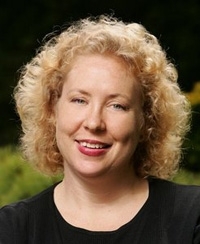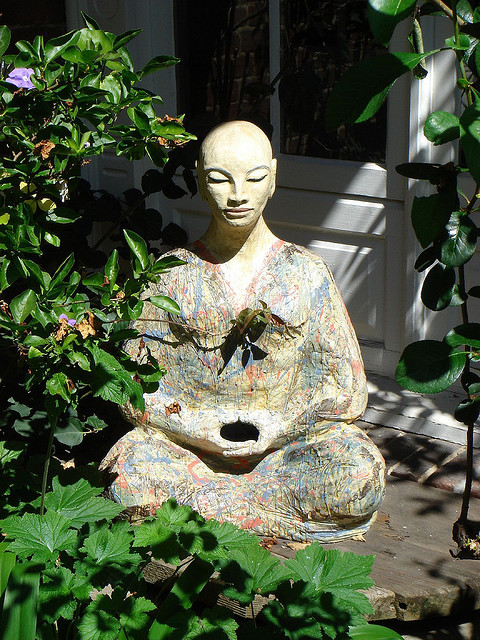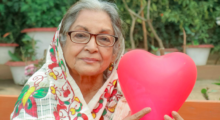Today SevenPonds speaks with Jennifer Block, an interfaith minister and Buddhist Chaplain who has dedicated her life to providing spiritual guidance for people in crisis. She is returning to teach the 2014 Contemplative Caregiver Course at the San Francisco Zen Center, which will be starting up on January 31st.

Credit: San Francisco Zen Center
Kimberly: What is Contemplative Care? How does it work?
Jennifer: Contemplative Care is a way of providing caregiving beyond a basic ‘how-to’ method. There is a lot of focus in contemplative care on both the caregiver and the care-receiver and how their connection, empathy or attention can go both ways. So whereas I might be caring for somebody and helping her eat, she might be, while she is eating, telling me a story about what it was like to grow up in San Francisco in the 1940’s, in an Irish-Catholic neighborhood, and what her first communion was like. In this example I don’t walk away from the interaction feeling like I gave something and that person received. I don’t leave feeling in some ways depleted. This stems from what we call mutual benefits.
Kimberly: Is there anything else that sets Contemplative Care apart?
Jennifer: In contemplative caregiving, the caregiver cultivates mindfulness as a skill, and then they bring that skill to their relationships so that they have a lot of awareness of the self and the person they’re caring for. The caregiver also does a great deal of reflection on aging and dying so that they have flexibility and equanimity and don’t think that dying is an emergency or that illness is a tragedy.
At the Zen center, the way that they live life is contemplative. They bring these principals to cooking, traditional meditation, gardening, housekeeping, recycling and to caregiving for people who are in need, whether they are elderly, terminally ill, or disenfranchised.
Kimberly: Can you give us a basic run-down of what Zen is?
Jennifer: For every Zen master you will probably get a slightly different definition of what Zen is. One definition would be meeting the moment with an appropriate response. Another would be to living fully with awareness and compassionate attention.
Words like ‘awareness’, ‘present moment’, ‘living fully’, ‘awakening to what is’ are common definitions of Zen.
Kimberly: What are some techniques that can be used to apply Zen practices to caregiving?
Jennifer: In particular, mindfulness practice is orientated towards the present moment and actually strengthens one’s ability to cope with difficult experiences. With mindfulness meditation, we focus on the breath, the body, thoughts, or feelings and the investigation leads to understanding and even equanimity with something that’s difficult, which in turn leads to the awareness of the difficulty changing that experience.
Kimberly: Can you give us some advice on how to use Zen teachings to help people through the grieving process?
Jennifer: Change coming and change going are a constant part of life. We can actually get used to change if we pay close attention. Mourners in particular will ask me, ‘when will my pain go away’. I don’t have any answer to that, but I do know that whatever they are experiencing now will not always be the same. Change is a difficulty but it is also a blessing. Meditation practice helps with this because you are paying careful attention to the change.
Mourners in particular will ask me, ‘when will my pain go away’. I don’t have any answer to that, but I do know that whatever they are experiencing now will not always be the same.
Something else I can offer is that as human beings, we have an innate ability to care for one another. We have been doing it for ever. It’s only recently that we have forgotten how. Mostly because of medical technology, which is wonderful, but a lot of people are growing up now without proximity to people who are sick, so as adults they are unprepared. When I train people, and when I spend time with them, what I really help them access is their innate capacity to care, and to figure things out.
If you are not feeling competent or prepared, another approach would be to get some help. Most people cannot care for another person AND themselves alone. To need each other is not weakness, it is intimacy. Intimacy is difficult and it can also make us feel vulnerable but we can bear with vulnerability, and there is a beauty in intimacy. We are all craving it. I get a lot of seniors in particular who are having a hard time with change and leaving care, and there is a loss of self-image. But I’ve met some really happy and lovely people who tell stories and don’t do much else each day. They can’t walk, they can’t feed themselves, they can’t cook, they can’t buy groceries, but they tell stories and they notice the change of the sunlight as it passes across the moon.
Intimacy is difficult and it can also make us feel vulnerable but we can bear with vulnerability, and there is a beauty in intimacy.
Kimberly: Give us more detail about the Contemplative Care Course. What is the type of material that is covered in the class?
Jennifer: The course is structured in three terms, and we study mindfulness meditation, impermanence meditation and compassion cultivation. We have classes, mentoring, and a practicum in the middle of the course so that it’s not all theory. It’s very much applied theory and it includes some real personal growth along with change and a shift in perspective among the people that come.
We study the contemplative care theory and we apply it to everyday situations. Some of the people that come are personal caregivers, such as family members, or professional caregivers like nurses and doctors. One person who came last year was taking care of her mom and was actually really resentful. She was upset because her mom wasn’t getting better, her mom wasn’t taking her advice, and her own life was set aside. When she came to the course she had a real freeing experience. She realized that it was okay that her mother doesn’t do it her way and that her mother didn’t need her all the time, and she got back to her own life. She came through the course learning to respect her mother and herself. I think in caregiving people can get really myopic and focused, and this course will broaden their focus, including onto themselves.
Kimberly: Lastly, can you give us a word of advice for people who are currently taking care of loved ones in their own home?
Jennifer: Please take care of yourself. Your physical, mental, spiritual, emotional wellbeing is just as important as the person you are taking care of. Ask for help. Take care of yourself. You belong.
Kimberly: Thank you for taking the time to talk with us!
Jennifer: Thank you!
Related SevenPonds Articles:
- What is Grief Coaching? An Interview with Dhyanis Carniglia
- How Does Yoga Aid the Grieving Process? An Interview with Antonio Sausys
- How to Cope with a Terminal Illness? An Interview with Michael Engelberg

 What is Contemplative Care? An Interview with Jennifer Block
What is Contemplative Care? An Interview with Jennifer Block



 Having an Estate Plan Is Essential – So Is Discussing It With Your Children
Having an Estate Plan Is Essential – So Is Discussing It With Your Children

 “Summons” by Aurora Levins Morales
“Summons” by Aurora Levins Morales














